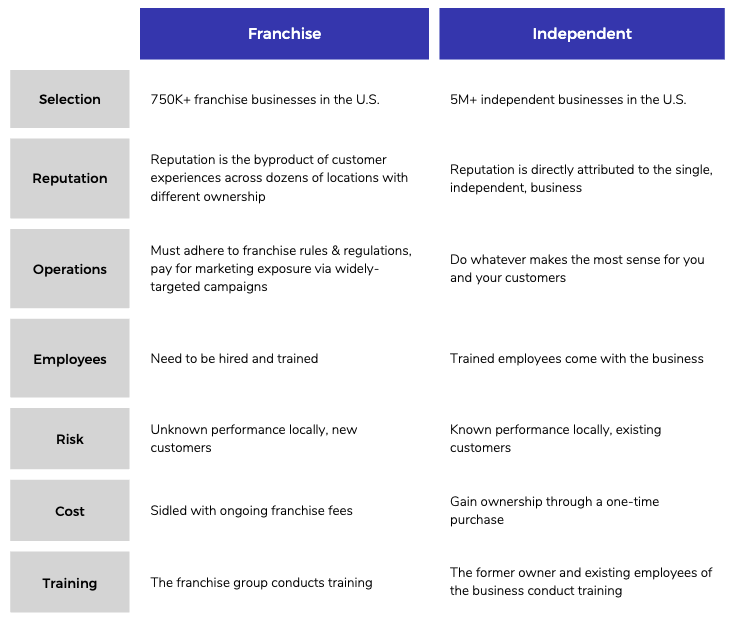Not quite ready to transact?
Subscribe to receive the latest resources for small business deals.
Franchises are a great option if you want to de-risk as a small business owner. The franchise group typically provides a number of valuable services: a training program for new owners, access to a built-out supply chain, managed marketing campaigns, and territory oversight. You may also benefit from the goodwill other owners have earned in their respective markets.
However, the services franchisors offer come at a cost to the franchisees–after all, franchisors need to make the franchise play worth their while. Moreover, ongoing services fail to address a key set of questions that arise at the very onset: will the new franchise owner be able to hire strong employees? Will the local market be receptive to the franchise? How can the franchise stay nimble while still adhering to the rules and regulations of the franchise?
There’s a convenience factor to handing over a lot of the operational reigns to the franchise. But there’s also a risk if things go south for the group and your franchise gets associated with mismanaged locations. How do you gain the benefits of business ownership while still setting yourself up for success as an owner? We believe the answer is to buy an independent small business.
Buying a Franchise vs Buying an Independent Business

Selection while there are franchises for almost any type of business, there’s a far greater volume and variety of independent small businesses. Moreover, many of the independent businesses are stalwarts in their communities and have a customer base they’ve built up over the course of decades.
Reputation the reputation of the franchise is not a function of one location alone. This can be incredibly beneficial for driving initial business as the new franchisee can piggyback off the goodwill and brand awareness of other locations. However, it also means the franchisee doesn’t have full control over the customer experience and negative experiences at other locations can harm your business. When you buy a small independent business, the reputation of the business is yours and yours alone.
Operations franchises are great because you’re plugging into a proven business model (as you are with an independent business), but franchises are infamous for enforcing rules to maintain a consistent brand. While these rules are beneficial to protect the brand, they can also be a barrier preventing your from capitalizing on opportunities in your market.
Employees we continue to operate in one of the most difficult job markets. There’s been a sharp fall in the unemployment rate since the beginning of COVID-19 to the point where we now find ourselves at a record low unemployment level. This means owners need to compete fiercely to attract quality labor. And if you’re planning on launching a franchise, you’ll be starting from scratch when it comes to the most important business input: high-quality labor. On the other hand, acquiring a small business almost always means you’ll have at least a few employees right out of the gate–many of whom are highly skilled, have relationships with customers, and are much more of a known commodity than new hires.
Risk the major attraction of franchises is they help owners reduce risk. This comes in a number of ways: the business model has been tested and proven in other markets, there’s an existing customer base that may patronize other locations (or at least help with brand awareness), there are processes in place to access critical inputs like inventory, and there’s a brand and marketing machine the new owner is tapping into. Of course, all the help de-risking gets passed along to the franchisee in the form of fees. Independent businesses also operate on proven business models. Additionally, many independent businesses have been around far longer than similar franchises, are known (and loved) in their communities, and have a reserve of loyal customers to prove it.
Cost while it’s true that franchisors are incentivized to enable success from franchisees, they’re also looking to make money: setup costs, mandatory equipment with generous margins built in, inventory minimums, marketing fees, franchise royalties–it’s all on the table and almost always binding. Independent businesses are much more flexible. Financing is negotiable and can even be used to help ensure a smooth handoff as is the case with seller notes.
Training franchises will always sell you on their training programs. To be fair, these programs can be quite good. Franchise groups know that they need to adequately empower new franchisees to keep the flywheel spinning for expansion. This is why the good franchise groups have invested heavily in training programs. However, these programs cater to the lowest common denominator franchisee and can be theoretical at times. In contrast, training for independent businesses is conducted on the job with actual employees and customers. The previous owner holds paper in the form of a seller note to make sure interests are aligned and the full value of the business is passed off to the new owner.
Not quite ready to transact?
Subscribe to receive the latest resources for small business deals.

Anthony is the Marketing Lead at Beacon. He previously spent his career working for software companies in Silicon Valley but is now focused on making it easier to buy and sell Main Street businesses. Anthony studied Economics at Brown University and resides in Austin.
Information posted on this page is not intended to be, and should not be construed as tax, legal, investment or accounting advice. You should consult your own tax, legal, investment and accounting advisors before engaging in any transaction.

Calder Capital

Sam Domino


